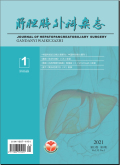肝胆胰外科杂志2024,Vol.36Issue(4):198-204,7.DOI:10.11952/j.issn.1007-1954.2024.04.002
PA-TACE的时机选择对肝细胞癌患者根治性切除术后近期预后的影响
Effect of PA-TACE timing on the short-term prognosis of patients with hepatocellular carcinoma after radical resection
摘要
Abstract
Objective To investigate the effect of postoperative adjuvant transarterial chemoembolization(PA-TACE)timing on the short-term prognosis of patients with hepatocellular carcinoma(HCC)after radical resection.Methods The clinical data of 103 HCC patients,who received TACE treatment within 6 months after radical resection in the Affiliated Wuxi People's Hospital of Nanjing Medical University from Jan.2015 to Dec.2021,was retrospectively analyzed.Patients were divided into the observaional group(n=53)and the control group(n=50).Patients in the observaional group received TACE treatment 4-8 weeks after HCC radical resection,and patients in the control group received TACE treatment 9-26 weeks after HCC radical resection.All patients were followed-up for 2 years postoperatively.The postoperative 2-year recurrence rate and 2-year survival rate were compared between the two groups.The incidence of adverse reactions during TACE treatment,and the differences in each evaluation scale index between the two groups 2 years postoperatively were compared.Results Compared with the control group,the observaional group had a lower postoperative 2-year recurrence rate[20.8%(11/53)vs 48.0%(24/50),χ2=7.429,P=0.006]and a higher postoperative 2-year survival rate[88.7%(47/53)vs 78.0%(39/50),χ2=5.316,P=0.021]after HCC radical resection,the differences were statistically significant(P<0.05).During TACE treatment,there was no significant difference in the total incidence rate of adverse reactions between the two groups(χ2=0.160,P>0.05).Two years after HCC radical resection,the PS score,Child-Pugh score,PS-SGA score and FPS-R score in the observaional group were all lower than those in the control group,but the differences were not statistically significant(P>0.05).The score of life quality in the observaional group was higher than that in the control group,and the difference was statistically significant(t=7.236,P<0.05).Conclusion PA-TACE within 4 to 8 weeks after HCC radical resection can reduce the early postoperative tumor recurrence rate,improve the survival rate,and improve the life quality of HCC patients.关键词
肝细胞癌/根治性切除术/术后辅助性肝动脉化疗栓塞/治疗时机/近期预后Key words
hepatocellular carcinoma/radical resection/postoperative adjuvant transarterial chemoembolization/treatment timing/recent prognosis分类
医药卫生引用本文复制引用
顾炜,张智勇,吴鸣宇,季圆..PA-TACE的时机选择对肝细胞癌患者根治性切除术后近期预后的影响[J].肝胆胰外科杂志,2024,36(4):198-204,7.基金项目
2022年度无锡市卫生健康委科研面上项目(M202254). (M202254)

